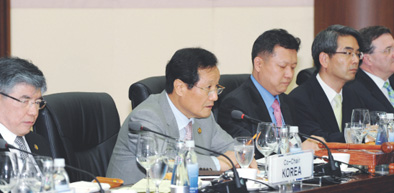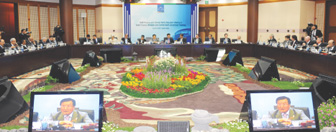Min. Yoon Chairs G-20 Financial Meeting
G-20 finance ministers and central bank governors issue communique in Busan confirming fast pace of global economic recovery
 The global economy is recovering faster than expected, but the latest financial volatility underscores the need for sounder fiscal health amid eurozone jitters, Group of 20 finance ministers said on May 4.
The global economy is recovering faster than expected, but the latest financial volatility underscores the need for sounder fiscal health amid eurozone jitters, Group of 20 finance ministers said on May 4.
In a communique issued after a two-day meeting of finance ministers and central bank chiefs, they said one of G20¡¯s top priorities is to attain strong, sustainable and balanced growth and pledged to work together to deal with challenges and support the recovery.
¡°The global economy continues to recover faster than anticipated, although at an uneven pace across countries and regions,¡± the statement said. ¡°However, the recent volatility in financial markets reminds us that significant challenges remain and underscores the importance of international cooperation.¡± ¡°The recent events highlight the importance of sustainable public finances and the need for our countries to put in place credible, growth-friendly measures, to deliver fiscal sustainability, differentiated for and tailored to national circumstances,¡± it added.
The G20 financial leaders welcomed European policymakers¡¯ ¡°determined¡± action in response to debt problems in the eurozone including Greece, Portugal and Spain, but called for those countries to make more efforts to improve their fiscal soundness.
The mood appears to be a little different from their April meeting in Washington, where they placed more emphasis on cooperation among peer countries in pushing for exit strategies from stimulus measures they introduced to ride out the worst economic downturn in decades.
The emphasis on fiscal health demonstrates that financial policymakers are worried about debt problems if investor sentiment worsens and global financial markets fluctuate, raising concerns that the pace of the global recovery might slow down.
With regard to financial sector reforms, they also agreed that the move is ¡°critical¡± to global recovery, and that they will push for ¡°stronger capital and liquidity standards¡± to that end.
¡°Building on progress to date, we affirmed our commitment to intensify our efforts and to accelerate financial repair and reform. Therefore, we agreed further progress on financial repair is critical to the global economic recovery,¡± they said.
¡°This requires greater transparency and further strengthening of banks¡¯ balance sheets and better corporate governance of financial firms,¡± they added. ¡°We are committed to reaching an agreement expeditiously, with stronger capital and liquidity standards as the core of our reform agenda.¡±
The G20 officials did not mention a bank tax, one of the most controversial issues being discussed over the past months. Instead, they admitted that there is ¡°a range of policy approaches¡± and agreed to develop ¡°principles¡± that could take into account each nation¡¯s different opinions and domestic circumstances.
A bank levy is among many proposed policy options that generally oblige banks and other institutions accused of causing market turbulence to pay for costs they incurred to market by taking excessive risks. Countries remain split over the idea, with Australia and Canada expressing their opposition. ¡°We agreed the financial sector should make a fair and substantial contribution towards paying for any burdens associated with government interventions, where they occur, to repair the banking system or fund resolution,¡± they said. ¡°Recognizing that there is a range of policy approaches, we agreed to develop principles reflecting the need to protect taxpayers, reduce risks from the financial system and protect the flow of credit in good times and bad, taking into account individual countries¡¯ circumstances and options and helping to promote a level playing field,¡± they added.
The financial leaders emphasized the need to reduce moral hazards associated with ¡°systematically important financial institutions and renewed their pledge to develop ¡°effective¡± tools and framework to that end.
More efforts will also be made to improve the transparency of hedge funds and credit ratings agencies that are blamed for the financial crisis due to market-distorting investment and failure to make accurate assessment of their products, respectively, according to the communique.
The finance ministers, meanwhile, renewed commitment on the framework for a strong, sustainable and balanced growth. ¡°The framework for strong, sustainable and balanced growth is a key mechanism by which we will work together to meet the immediate challenges of supporting the global recovery and achieving our medium-term shared framework objectives,¡± they noted.
In the meantime, the G-20 members need to make concerted efforts to narrow the economic gap between emerging and developing countries, said a senior Korean government official.
At the World Bank-Korea Conference in Busan, April 30, Sakong Il, chairman of the Presidential Committee for the G-20 Summit, said member countries recently agreed not only to include growth-oriented development issues in the Seoul Summit but also to initiate a working group to further outline methods of progress. ¡°The G-20 leaders in Pittsburgh agreed on implementing the framework for a strong, sustainable and balanced growth of the global economy. Toward this end, the G-20 has been focusing on rebalancing the global economy, particularly with regard to current international macroeconomic imbalances,¡± he said during the conference held on the sidelines of the G-20 Finance Ministers and Central Bank Governors¡¯ Meeting, which kicked off on Friday for a two-day run.
The gathering was designed to pave the way for the G-20 by setting the key agenda for the summit in Toronto this month. Korea will chair the G-20 Summit in Seoul in November, which is the first time for a country outside of the Group of Seven to host the meeting. ¡°It is our strong belief that for sustainable global growth the G-20 has to turn its attention to making the world an more egalitarian place. The rationale behind it is simple because it is just not possible for the world to achieve sustainable and balanced growth as long as there is a persistent divide in development.¡±
His speech is in line with Cheong Wa Dae¡¯s stance. ¡°Until the upcoming G-20 Summit in Canada, crisis management will be the main agenda, but after that, Korea is trying to focus on advancing the improvement of emerging economies,¡± Shin Hyun-song, special adviser to President Lee and moderator of the Korean G-20 initiative, told reporters.
Sakong Il, 70, believes that taking the growth-oriented development agenda to the table will contribute to the group of leading economies gaining recognition at the credible and legitimate prestigious assembly for international economic cooperation. nw
Minister Yoon Jeung-hyun of the Ministry of Strategy and Finance, second from left, chairs the G-20 Finance Ministers and Governors of Central Banks Conference in Busan May 3-4.
A view of the G-20 financial meeting in Busan.
Courtesy on the MOSF
3Fl, 292-47, Shindang 6-dong, Chung-gu, Seoul, Korea 100-456
Tel : 82-2-2235-6114 / Fax : 82-2-2235-0799